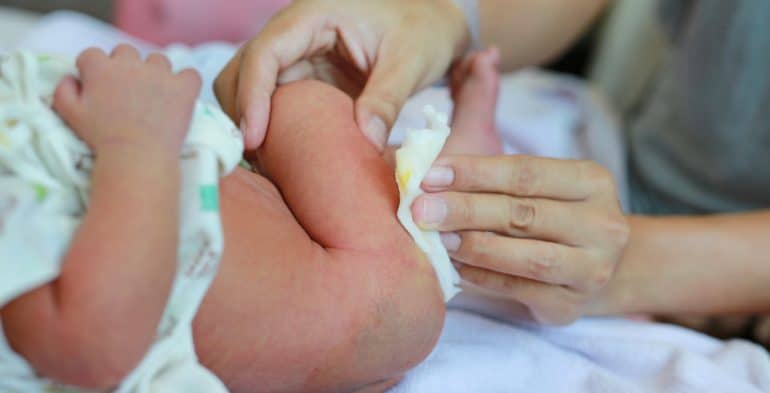
Baby poop – all you need to know about poop!
The first poop your baby will pass is known as ‘meconium’ and is a dark green/black substance. Sometimes this is passed during labor but usually it continues after birth and will remain like this for a few days. This is a good sign that your baby’s bowels are in good order and is not to be concerned about.
After the meconium has passed through your baby’s system it will be replaced by a different type of poop. This will depend on whether your baby is breastfed or formula fed or a mixture of both.
If you are breastfeeding your baby will pass a poop loose in texture with a slight curdled appearance and more yellow in color like mustard. It often has a distinctive sweet smell.
If you are formula feeding this milk is processed slightly differently and the poop is similar in colour and odor. Formula poop will probably be firmer and more like a paste.
How much poop should you expect in a day?
All babies vary slightly but as a rule formula fed babies produce a firmer poop with a stronger smell. This is contrasted by the looser poop of a breastfed baby. Formula fed babies can be prone to constipation, particularly if switching between formula and breastfeeding. For this reason it is a good idea to do this gradually. Some infant formulas can cause a baby’s poop to appear greenish in color which is something to be aware of but should not cause concern.
From week one you should expect three to four poops a day reducing gradually over the first year. Changes in feeding, moving to formula, weaning and teething are all factors which will change the texture and number of poops your baby will produce in a day.
When to be concerned about baby poop
If you find blood or mucus in your baby’s nappy seek medical advice to examine cause. Your baby may be constipated if they are producing hard pieces of stool. Conversely, loose watery stools that seep through the nappy and into the baby’s clothing could be a sign that they have a bug.
Don’t worry though, you will get familiar with your baby’s poop and notice changes. However if your baby has a temperature or seems unsettled it is important to ask for medical advice.









